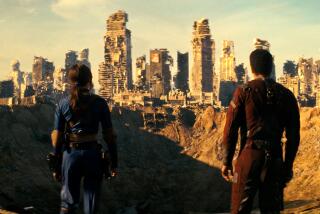Television Review: ‘Falling Skies’
- Share via
Like many members of the Spielbergian generation, I grew up in a time when children spent their summer days roaming. Carrying canteens and old canvas satchels, we were inevitably on the run, mostly from Nazis, though occasionally from aliens. We dashed through cornfields, set booby traps in the woods, hid in trembling, sweaty groups behind trees and punched twitchy younger siblings to keep them from giggling. We bent branches into bows, sharpened sticks into spears with our pen knives, ate mint and blackberries and roots we told ourselves were sassafras and tried to build campfires with no matches. We nursed our own wounded because if any sobbing, bleeding child made his way back to Mom, everyone would be in big trouble.
We were the children of political assassination, of Watergate and Vietnam. Other more modern distractions were on the horizon — Pong had been invented and then Super-Pong — but none of our families could afford an Atari, and anyway we were happier playing soldiers, testing our ability to survive on wit and stealth and really good knots.
There have been many films and television shows based on this scenario, on the universal desire to prove that humans, soft and increasingly teched-out, can still best the elements and a common enemy if push comes to shove. But none has captured the sweet and thrilling adrenalin rush of summer like TNT’s new series “Falling Skies.”
Executive-produced by Steven Spielberg, who has always understood the importance of pretend, “Falling Skies” sets in motion a classic summer premise: “Let’s play that aliens have taken over the world.”
Serious without being grim, uplifting without being saccharine, “Falling Skies” dares to image what feature films will not — a world in which Will Smith or Aaron Eckhart did not bring down the mother ship in time. This time, aliens are setting up shop around the world, building huge metal structures over “all the major cities” (which, for purposes of the plot, includes Boston).
On one side: The aliens, green, six-legged and known as Skitters. They have an army of bi-pedal robots armed with obligatory death rays that ruthlessly mow down any adult or child in their path. Teens and tweens are taken hostage to be rendered dead-eyed and compliant by nasty lobster-tail-like harnesses attached to their spines.
On the other: the Massachusetts 2nd, led by the tough but just Weaver (Will Patton) with Tom Mason (Noah Wyle) as his overly learned but still manly second in command, with pediatrician Anne Glass (Moon Bloodgood) providing medical assistance and humanism. Mason is our point man, a history professor with an expertise in the military, which enables him to lead recon groups and make stirring comparisons to other oppressed but triumphant people (and not, say, the Spartans at Thermopylae).
Tom also embodies the spectrum of loss — his wife died during the invasion; his young son Matt (Maxim Knight) mourns; his middle son, Ben (Connor Jessup), has been taken by Skitters while the his teenager Hal (Drew Roy) now wields heavy weaponry while they scavenge supplies.
“Seven or eight months ago you wouldn’t let me ride my bike over to Julian’s at night because I didn’t have a bike light,” Hal says, as his father tosses him a mag. “Now you’re giving me extra ammo.”
As the über-narrative of battling the aliens and saving the harnessed children unfurls, B-plots abound — an ex-con leading a group of skinheads must be dealt with, there is an attempt to establish contact with a captured Skitter, untrained soldiers make many mistakes — but it is this contrast between the new and old world orders that provides the real tension of the show. A grimy band of people who in their previous lives would never know one another must form a warrior-based civilization that can still appreciate the moment when Matt celebrates his birthday.
Though it is reductive and somewhat lazy to insist that the colors we show when the chips are down are the true ones, the point of any adventure is to test our mettle in a new environment. Spielberg and his writers, which include Robert Rodat (“Saving Private Ryan”), Graham Yost (“Justified,” “The Pacific”) and Mark Verheiden (“Heroes,” “Battlestar Galactica”), understand that good storytelling balances epic narrative with engaging characters and enough detail to keep things real and resonant — people need to eat, kids still need school.
Along the way, all the post-apocalyptic issues are raised: power and corruption, the rights of the individual versus the needs of the community, the essential kinks and glories of character that no outside force can change.
But in the end, if children are going to strap on guns, set traps, jerry-rig explosions and dive for cover during gunfights, it had better be fun. And “Falling Skies” is very much that, the serious fun of those long summer days that you and your kid brother spent blowing up the bad guys and saving the world.
More to Read
The biggest entertainment stories
Get our big stories about Hollywood, film, television, music, arts, culture and more right in your inbox as soon as they publish.
You may occasionally receive promotional content from the Los Angeles Times.











